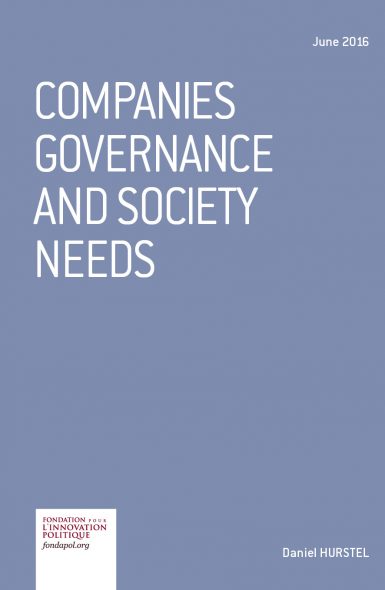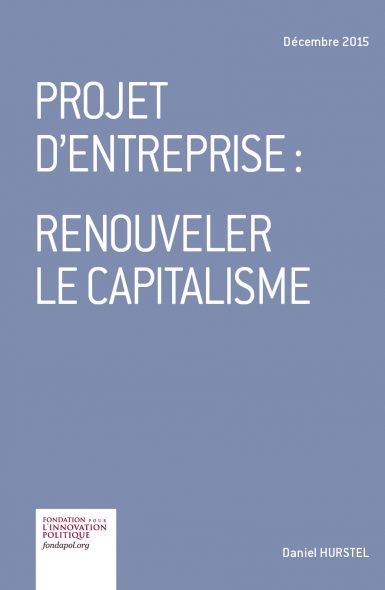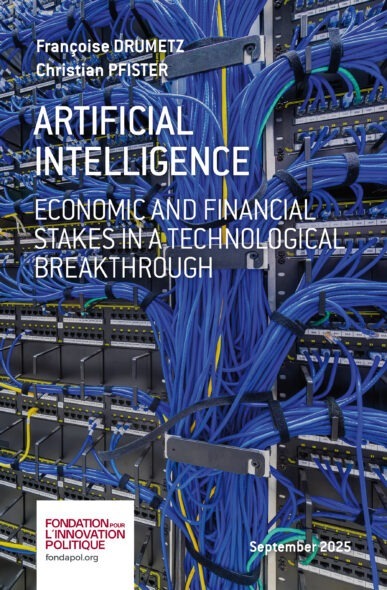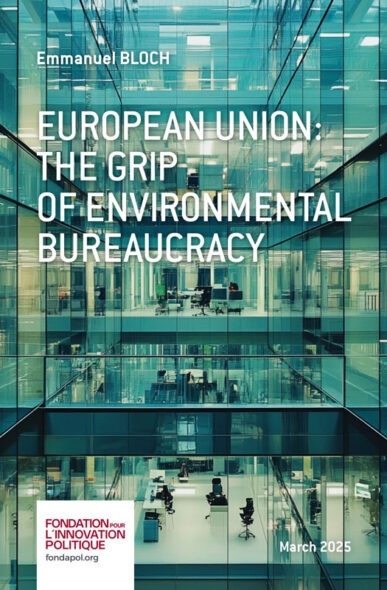Introduction
Business can play a central role in the responses to the challenges confronting society
Businesses need to change to survive
Some false beliefs that need to be discarded
Making profits is the only goal of a business
The company belongs to shareholders
To be virtous a company only needs to be prosperous
The solution is transparency
Encouraging signs in favor of a change
Summary
Companies are faced with both an imperative need and an unprecedented opportunity to renew themselves. It is widely acknowledged that businesses can play a major role in the search for reasoned growth, generating wellbeing and progress. If they are not the ones to take on this challenge, it will be difficult to find anyone else to do it. States lack the financial resources and the necessary flexibility; philanthropy and more generally social economy are progressing but they do not to any extent have the power held by capitalistic companies. Furthermore, with the accelerated pace of digital revolution and technological innovation, businesses can offer new solutions to climate change, health, economy and environment challenges.
The excessive pursuit of a simplistic end: creating shareholder profit has isolated companies and fed suspicion against them. Many of them now complain about this, without reforming however. The current models inherited from the past and above all company purpose and governance need to be thoroughly reconsidered.
In an increasingly complex environment, tomorrow’s successful companies will be those which will adopt a flexible governance capable of promoting innovation, while analyzing their contribution to well-being at work and to the preservation of common goods. Possible conditions of such governance – modification of the corporate purpose, prevalence of the enterprise project, accountability to all stakeholders – while safeguarding the essence of the company itself – delegation of authority to the chief executive and search for measured profit as the condition to durability – are described here. These propositions are radical but they will put the enterprise back at the service of society.
Daniel Hurstel,
Lawyer member of the Paris Bar Member of the Académie Royale des sciences, des lettres & des beaux-arts of Belgium.
this statement was tempered during the pope’s visit to the united states, in his speech before the joint session of the united states Congress in Washington, on september 24 He said that companies’ activity is a noble calling, aiming to create wealth and improve the world. He also insisted on the importance of encouraging entrepreneurial spirit.
also by pope Francis, see his apostolic exhortation evangelii gaudium (the Joy of the gospel) of november 24 2013 and the encyclical laudate si (praise be to you), June 2015.
Naomi Klein, this Changes everything: Capitalism vs. the Climate, 2014.
notably Claire régnier et al. “mass extinction in poorly known taxa”, proceedings of the national academy of sciences, vol. 112, no. 25, June 23 2015, in which the authors estimate that at least 7% of the world’s fauna became extinct through human action since the beginning of the industrial revolution (www.pnas.org/ content/112/25/7761.full).
Thomas Piketty, Capital in the twenty-First Century, 2013.
on this point, see anand giridharadas’s contribution at the aspen institute’s action Forum, on July 29 2015, “ the thriving World, the Wilting World & you” (www.asorg/video/anand-giridharadas-thriving- world-wilting-world-you).
Blackrock is the largest investment fund in the world (4600 billion dollars in assets under management as of February 2016).
“Once capital becomes an idol and guides people’s decisions, once greed for money presides over the entire socioeconomic system, it ruins society, it condemns and enslaves men and women, it destroys human fraternity, it sets people against one another and, as we clearly see, it even puts at risk our common home, sister and mother earth”. This is a strong (excessive?1) attack, but when Pope Francis criticized yet again the “inhumanity” of the capitalist system during his South American tour in the summer of 2015, he expressed, in the words of his conviction and of his faith, a judgment of capitalism, which is gaining ground2. Criticism is generally voiced more strongly in times of crisis. The 2008-2009 financial one opened the way to criticism voiced all the more strongly in a world becoming aware of serious issues whether around climate change3, biodiversity4 or inequalities5, including even philanthropy6 – when it is accused of being an alibi for the continuation of capitalism in its present state. The conviction that capitalism in its present form neither ensures an allocation of capital adapted to the needs of society nor proposes the right governance is increasingly shared while skepticism on the actual net wealth creation achieved by capitalism is growing. If serious attention is not given to the need to adapt capitalism to its new environment, there is a major risk for it to be fully rejected or at least to see the current divisions strengthen, and an even higher risk that the issues threatening our future are not adequately tackled. The current deficiencies of capitalism are in our view largely due to inappropriate governance, which should reflect deeper attention to the impact of the business activity. The idea promoted here is that governance should be structured on the realization of the company purpose, which should in turn be privileged over short-term shareholders’ interest.
There is a large consensus that short-termism needs to be given up. This consensus is even gaining ground in the financial sector; it was the agenda of a recent meeting gathering Larry Fink, head of BlackRock7, Warren Buffett and the heads of some of the largest financial investors, Fidelity, Vanguard, Capital Group and JP Morgan Chase. For more than 30 years, the smooth functioning of markets and the interest of the shareholder have wrongly taken priority over the development of the enterprise purpose. Shareholders are legitimate in benefiting from its realization but should not use their control rights (expressed through the voting rights) to serve their own interest. There is no question of disadvantaging the shareholder or of incriminating the search for profit – only profits can ensure the durability of the company and the remuneration of shareholders for the risk they take. An enterprise gathers many diverse individual interests. Rather than hierarchizing between those individual interests, enterprise should take all of them into account and maximize the company’s performance. A company needs to be freed from the hold of a single stakeholder.
This is all the more important that we are going through a period of accelerating change and increasing complexity. The Economist recently wondered whether the “Capitalist Empire” would soon come to an end, as did the Roman Empire at the time of Augustus. Empire or not, it is at risk and is suffering from an unprecedented loss of trust. The Volkswagen scandal has not contributed to improve the situation! But the current environment is also full of opportunities. Just consider the new spaces conquered by the digital revolution and the ones that follow it: nanotechnologies, new energies, robolution, artificial intelligence, to name but a few, promise an unprecedented potential of innovation, progress and profit. This upheaval of the world in all areas is a unique opportunity to deploy and amplify companies’ extraordinary capacity to have a positive effect on the well-being of society. If we are increasingly conscious that traditional resources are limited, we also realize that our knowledge of the world is, as the universe itself, still expanding! The infinitely small and the infinitely large offer us wide unexplored territories that we should be able to conquer (even more so with the help of artificial intelligence) for the benefit of all.
The beginning of the nineteenth century was marked by the adoption of company laws in many countries which responded to the need for growing economic activity; the end of the nineteenth century by the protection of employees, with the emergence of “social economy” and new forms of companies such as cooperation. A new challenge needs now to be faced, but not more difficult than the one faced by our “grandparents”: adapting our business organizations to society’s needs and to limited traditional resources. We must not be blocked by what we know and be capable of imagining and implementing new roads; we must design what is within reach!
Confronted to such upheavals, businesses and society are more than ever linked to each other. For the link to become fruitful, we must discard old beliefs (“companies belong to their shareholders”, etc.), which do not correspond to the realities of today’s world anymore, design the outlines of virtuous governance and redefine the way shareholders exercise their rights and finally reassert the contribution of the entrepreneur and then of the company’s employees. The very practical propositions made here are based on the conviction that capitalism is a flexible tool, with much better capacities of adaptation than can be conceived by the sterile minds of those who claim to defend it. Let us first consider the main aspects of what society expects from companies.
Business can play a central role in the responses to the challenges confronting society
Cf. Frédéric Baule, Xavier Becquey and Cécile renouard, l’entreprise au défi du climat, les Éditions de l’atelier, 2015.
the turnover of the ten first world companies in 2015 at 3268bn dollars is equal to the gdp of France and Belgium together, Walmart’s (485 billion dollars in 2015) can be compared to norway’s gdp (463 billion dollars in 2015) or venezuela’s (400 billion in 2015) and toyota’s (248 billion in 2015) to the gdp of greece (245 billion in 2015).
yuval noah Harari, sapiens, a Brief History of Humankind, Harper Collins
google is currently conducting research in several scientific areas, including a computer system that operates similar to the brain, smart contact lens for diabetic patients, aging and age-related diseases, cancer and heart attack detecting pill, genome storage in the cloud, robotic surgery platform.
The news constantly remind us of the scope of the challenges confronting societies: demographic explosion, climate change8, depletion of natural resources and biodiversity, rise of inequalities and also the dominance of financial markets or the discontent of too many individuals within companies…
How do these challenges “interfere” with business activities? Are businesses in anyway concerned? The answer is yes for many reasons among which: Because public authorities cannot deal with these challenges alone. States are increasingly short of funds. Additionally, at one end of the spectrum they lost the power to act at the right level when facing increasingly powerful9 and global companies, and at the other one because they also have neither the flexibility nor the efficiency necessary to elaborate solutions adapted to issues which must be addressed at a local level.
Because even those who do not believe in a company’s positive responsibility – States alone being in charge of public interest – accept that the negative impact of businesses (pollution for example) needs to be limited to the extent possible (or at the minimum, profits generated need to be appraised in view of the negative impact of the activity). Companies’ interest is that they do this by themselves rather than to be constrained to do it by regulators. Because companies have unprecedented power, as pointed out for example by the Israeli historian Yuval Noah Harari in his recent book. “We are probably on the eve of the greatest biological revolution in the history of mankind, a revolution with effects of such impact on man that they cannot be left in the hands of market forces alone”10. According to Y. N. Harari, what has always been the specificity of mankind lies in the capacity to federate groups around some “fictions”, “myths” or “beliefs”, from religions to human rights, including the nation and the limited liability company. Limited liability companies are among mankind’s most ingenious inventions but they exist only as the fruit of our collective imaginations, even if we are so used to their presence that we have forgotten this aspect. In the past, a human enterprise lived and died with its founder/owner, the modern company has a life of its own, thanks to our common faith in the fiction of legal codes. So, the historian invites us to use the “fiction” of the business to align its interests on those of society and to help direct the balance of powers in a positive way for the preservation and possibly the increase of our common goods.
Because of the recent progresses of science and technology and the fact that research by companies or in cooperation with independent research laboratories give them access and control over products interfering with (and even shaping) fundamental features of our daily and sometimes intimate life. Companies are then placed before unprecedented ethical responsibilities. The human limits we are used to and which characterize our mortality are questioned and the alliance between the enterprise and science (Google’s new fields of activity are a striking example of this alliance11) make it dangerous for mankind to let the capital model prosper in its existing framework, i.e. without an analysis of the impact of its activity. Finally, some products designed by businesses also shape our way of life. Can all of this be left to shareholders’ primacy, or even to companies’ leadership and escape at the level of the company from thorough analysis?
If society needs the positive action of businesses, the latter must also evolve for reasons pertaining to their own durability and legitimacy.
Businesses need to change to survive
the top 25 companies held $721.3 billion in cash in ge reported $90 billion in cash in 2015, microsoft $85.4.
according to a report by s&p Capital iQ.
in the wake of toyota and mitsubishi, Japanese firms launched record buyback the movement in France is far from these amounts (buybacks should reach some 20 billion euros in 2015 for CaC 40 companies), but they are on the increase: airbus, schneider, sanofi, publicis, vinci have integrated buyback operations into their yearly program (the list is not exhaustive).
aranca, Buybacks & dividends, a trillion dollar offer, 2015.
a supposed obligation for the company to base its decisions on the maximization of shareholder value.
as of 9 February 2016, twitter had a market capitalization of 8 billion dollars while the company has never turned a profit in its history. over the first three quarters of the fiscal year 2015, it has reported a net loss of 431 million dollars. likewise, amazon’s market capitalization was 227 billion dollars as of 9 February 2016, whereas the company reported a mere 596 million dollars in net profit in 2015, after a 241 million loss in 2014.
investment companies were one of the largest groups of investors in s. companies in 2014, holding 30% of their stock (investment Company institute, 2015 investment Company Fact Book). Hedge funds have a record level of capital: 3,197 billion dollars, as of 30 november 2015 (2016 preqin global Hedge Fund report).
Financial times, 8 may 2014.
the care movement – focusing on the concern for others – is interesting in this respect, even if it is not reproducible for all projects.
similarly, companies can take inspiration from experiences in the non-profit field – for example the moroccan lalla salma Foundation, which sources older generation cancer drugs. their price fall quickly when new versions, sometimes without essential new characteristics, are launched, and many more patients can be these experiences are linked to the notion of sobriety, highly in vogue in some circles of economists.
see the actions of the enterprise and poverty action tank presided by muhammad yunus, martin Hirsch and emmanuel Faber.
see michael porter and mark r. Kramer, Creating shared value, Harvard Business review, vol. 89, no 1-2 janvier-février 2011, p. 62-77.
We are at the end of a cycle. Traditional business models are on their last legs. This can be seen in one interesting new feature: the massive liquidities of many large companies and their corollaries12 – share buyback plans – are the symptoms of the coexistence of large profits and reluctance to launch new projects. Total payouts for dividends and stock buybacks from S&P 500 companies have increased by around 100% in the past decade, from $507 billion in 2005 to $934 billion in 201413. The trend is global14. Between stock buybacks and dividend increases, over $1 trillion15 ended up flowing to shareholders in 2015. These large amounts derive from past profits or proceeds of sales of businesses which have not been reinvested! Why is that? Many companies develop fewer projects which they consider would generate the profit level expected by their shareholders. In front of a complex world which they cannot decipher, many managers hesitate on the direction their company should be taking. They keep the cash to be able to seize acquisition opportunities. All of this shows a real disarray and a difficulty to build coherent strategies answering simultaneously to shareholders’ short term expectations, the desire to carry out the enterprise project, the unknown evolution of client behavior as well as technological disruptions to come. Critics of share buybacks consider them, rightly sometimes, to prove the power of markets and the greed of shareholders who are more concerned with immediate gains than with the future development of the company (particularly when R&D budgets decrease and share buybacks increase). They also add that chief executives back, or even encourage these buybacks because their pay package incites them to do so. This may be true, but is it bad management to return money to investors to be used for other projects (including some to be identified later by the company and for which capital increases are always possible)? More importantly, rather than castigating share buybacks and charging greedy investors, this new reality must be seen as a sign of the perplexity of business leaders which can only grow with the recent rapid drop in the valuation of high tech and web companies. Companies need to develop ways to reinvent themselves to ensure their future and durability and to use their cash flow in an efficient way.
In this uncertain environment where businesses models need to be reinvented, it is more important than ever for companies to protect themselves against the short-term pressure of financial markets. The drifts observed in the last few years in companies submitted to the diktats of shareholder value16 derive from privileging short term financial interest at the expense of the performance of the enterprise project. The response to these drifts needs to be devised carefully. It is important not to focus on one apparent culprit, i.e. the financial world. Driving savers away from the market or diminishing the liquidities offered by markets, banks or private equity funds would not constitute a progress. Markets have developed their own logic, largely disconnected from the realities of enterprises. A striking example is the valuation of some innovative companies17. This absence of correlation with the underlying asset is a ferment of financial bubbles. Even more importantly, it is highly questionable when the “market” logic leads the investors to capture the powers given to them under current company governance and use them to maximize these valuations, independently from the enterprise’s own interest. Companies then evolve from active subjects to passive objects, i.e. means of wealth enhancement.
That was not the idea when statutes and bylaws granted control over companies to shareholders. A company owns a business and is created (and given legal personality) to enable the business project to be carried out and not to improve market efficiency. Let us strive to reform the system rather than considering this or that individual behavior. Enron alone has no more condemned Anglo-Saxon capitalism than Volkswagen has condemned the Rhineland model. More serious than this or that executive officer’s greed, it is the isolation caused by the blind pursuit of an elementary goal, which generates wrongdoings. The situation of shareholders primacy is exacerbated by the fact that institutional investors have an unprecedented share of major companies’ capital18 and are generally less interested in the enterprise project than in share performance. For their own sake they should evolve. There is no certainty that voting rights will for ever be granted to shareholders. There is a widening gap between what shareholders contribute to the company – capital in unprecedented low amounts compared to the enterprise’s wealth – and their rights over it. They should take more interest in the business and use the voting rights rather than trust formal proxy recommendations. To achieve this shift, companies should also give their shareholders non- financial information on strategic issues. Nobody in particular is liable for the current deviation but we all are responsible for finding a cure.
The founders of major Silicon Valley companies have perfectly understood the risk of shareholders’ interference with long term entrepreneurial projects. They are protecting guidance over the projects companies and strongly limit third party shareholders’ power by giving themselves multiple voting rights. In some European countries, the way to achieve the same result is to use the “société en commandite” which disconnects holding of capital and voting rights. Some “sociétés en commandite” have a long well-proven track record of protecting a company’s purpose from short term financial interests. The need for reform is gaining the heart of the system itself. When Pfizer tried to acquire the Anglo-Swedish group AstraZeneca in the spring of 2014, Martin Wolf, one of the most influential columnists in the City and in business circles, strongly questioned the validity of shareholders’ vote cast in their sole interest without any consideration for the other stakeholders in the business19. Finding a new balance ensuring both the development of the enterprise project and the flexibility of capital markets is achievable but not under existing conditions.
Tomorrow’s successful company derives from a new modus operandi.
In the digital age, the company will need a form of governance which is responsive to consumers’ needs and transforms these needs into opportunities to create value and foster innovation. The digital revolution and its consequence – the possibility for consumers to organize their own product or service according to their own needs – is a major change which fundamentally alters the way companies will operate. At the same time, the nature of competition has shifted from increasing market share to capturing a strategic resource – the multitude of potential consumers. This is achieved by deploying around individuals what Henri Verdier, director of Etalab, the French Prime Minister’s Open Data service, calls a “value chain”, where everything is integrated into a coherent whole, entirely thought around the quality of user experience and where global value is difficult to divide into segments.
Company governance must take into account this change, which highlights the need for horizontal and not vertical organizations and for the capacity to adapt to growing change. Likewise the major role played by many employees whose principal task shifts from carrying out a duty to imagining and designing innovation, increasing cooperation with third parties (research centers, startups, subcontractors, associations, NGOs) and the growing importance of incorporating diverse stakeholders’ interests and views into the decision-making process must also be integrated in this new governance model. Another consequence of the new organization of the value chain is that companies are not responsible anymore for an integrated vertical economic activity. Many of them will act as anonymous subcontractors of vertical processes conceived by others. The question of the purpose of the company is then raised in a new and complex way.
Permanent innovation is stimulated by a collaborative approach as for example in the collaboration efforts between large companies and start-ups: technological watch, participation in incubators, organization of hackathons, support to entrepreneurs… This is a time of collaboration, in a permanent and fertile cultural melting pot generating a new ecosystem for each stakeholder. Existing governance aiming to protect shareholder value makes this evolution very difficult, or even prevents it. The idea of creation of economic value through value for society may be the next step in the evolution of capitalism.
In this context, the opportunities offered by the BOP market (Bottom of the Pyramid), i.e. the market of low revenue consumers (less than 3000 dollars a year) and its corollary, reverse innovation (innovation designed in developing countries before spreading to the industrialized world) are promising: growth potential for companies and a significant contribution to the decrease of poverty in the world – one of the UN’s main development objectives for the millennial. These markets demand that companies move from a model where they sell predesigned products or solutions to the creation of ecosystems integrating the entire value chain, from sourcing to distribution, and local client investment capacities, with the aim to respond to objective local needs. Here again governance must not hinder either the implementation of a project guided, as never before, by the consumer’s need20 and his environment, nor the creation of this need by high-level marketing and novelties with no real efficiency21.
Similarly through various projects, Crédit Agricole or Danone in particular with Grameen Bank, Engie, Orange or Essilor, Total (Awango program of sun powered lamps in Africa), L’Oréal (program of micro distribution of some products by women from the Rio favelas, in Brazil) or Lafarge (delivery chain of ready-to-use concrete in India and new binders for earth bricks in Africa) and many others22, have developed specific business models where the social purpose and not the lucrative one guides the choices. Those projects remain ancillary to these businesses’ principal activities and purpose and will therefore be limited in scope (and in addition are financed through traditional lucrative activities) but they show that reverse innovation and pride of working on something which makes sense are realities.
These experiences are closely connected to a more general reflection on the way the enterprise and businesses consider social issues. This notion is the subject of Michael Porter and Mark Kramer’s research on the concept of “shared value”. In a paper published in 2011 in the Harvard Business Review, the two researchers support the idea that rather than seeing social responsibility imposed on them from the outside (by governments for example), businesses should adopt it and see opportunities for profit in social issues, while cooperating actively with all stakeholders23. Similarly, Bruno Roche, chief economist of a major food group, Joy F. Jakub, director of external research and Colin Mayer, work with the Oxford University on the economics of mutuality – an approach of the company where the sharing of created value is in itself a criteria for management choices with evaluation not through profit, as in Porter and Kramer, but also through the social and human values generated by the activity.
All employees feel the need to give meaning to their professional activity. Demotivated employees regain motivation when they work in an organization that defends and implements values compatible with their own ones; this is a source of efficiency and competitiveness for the company but more importantly of employee satisfaction. This is in no way naïve: the recent controversy about working conditions at Amazon shows that arbitrating between different interests within the company does not mean satisfying each of them.
Some false beliefs that need to be discarded
Making profits is the only goal of a business
encyclical laudate si (praise be to you), June 2015.
The purpose of a company is the sharing of profits by shareholders. This is the first belief – and legal reality – that needs to be pilloried. Designed more than two centuries ago, this conception of the company was pertinent at that time and did constitute a progress over individual activity. It allowed economic activity to multiply through capital. This was in a world where resources were thought to be unlimited. Economic activity was considered good a priori (and to a certain extent it was), in largely unexplored territories. This does not correspond to our reality any more for two main reasons: first, in a world of finite resources, it is urgent to reevaluate constantly the acceptability of any damage caused to the environment or of increasing inequalities (in this respect, the connection made by Pope Francis between climate and poverty is new24). Second, company creation has largely freed itself from capital ownership. The notion of “share capital” has become much less pertinent. Roles are reversed: now owners of capital court companies. With only slight exaggeration, it can be said investors have become suppliers. They no longer bring companies its most “valuable” elements (in addition to the reason of its existence: its purpose) which are its organization, innovation capabilities, intangible assets and above all the trust they enjoy (i.e. the adhesion generated among employees, but also, more broadly, among its stakeholders and the ecosystem where its products or services are used). They are developed first by the founders and in different order depending on the companies, by employees, suppliers or subcontractors.
Starting from there, the company goal cannot be profit sharing by shareholders which is only one of the legitimate interests at stake. Its purpose is to develop in a profitable way its project in line with the needs of society.
The company belongs to shareholders
Olivier Favereau and Baudoin roger, penser l’entreprise. nouvel Horizon du politique, parole et silence, 2015.
This theory was summarized in an article by milton Friedman entitled the social responsibility of business is to increase its profits, published on 13 september 1970, in the new york time magazine.
They are the company’s agents not the shareholders’, which in fact means they have no principal and are at risk of being revoked by the shareholders.
Lynn Stout, the problem of corporate purpose, issues in governance studies, no. 48, June 2012.
36 000 billion dollars in 2014 for pension funds alone.
In oeCd countries, pension funds, investment funds and insurance companies have increased their total assets under management by more than 50% from 2000 to the largest increase has been for investment funds that have increased their assets under management by 121% (s. Celik, m. isaksson, institutional investors and ownership engagement, oCde, 2014).
While a few activist funds were managing less than a total of $12 billion in 2003, the activist asset class has increased to more than $112 billion in assets under management for activist hedge funds (J.p. morgan, the activist revolution, understanding and navigating a new world of heightened investor scrutiny, January 2015).
Capitalism’s unlikely heroes, the economist, title page, 7 February 2015.
On this subject, cf. William lazonick, profits without prosperity, Harvard Business review, vol. 92, no. 9, september 2014, 46-55.
It is time to question the widely spread idea according to which a company “belongs” to its shareholders. Shareholders own shares, in consideration for the funds they have made available to the company, get returns via the distribution of dividends and possibly increase the value of their shares. Olivier Favereau, professor of economic sciences at the Paris Ouest Nanterre La Défense University and a team of multidisciplinary team at the Collège des Bernardins in Paris, among others, have undertaken to demonstrate this falsehood and to explain all its negative, if not destructive, consequences on the way companies work25.
This notion, it must be recalled, has prospered on the basis of Milton Friedman’s ideas and those of the Chicago School of Law and the Law and Economics theory, initially to counter the excesses of managerial capitalism (a risk never to be underestimated) of the past at a time of relative scarcity of capital. For the American economist, it was crucial to have a strict division of tasks: the company’s responsibility is to satisfy the shareholder’s interest26 and the State’s is to guarantee the general interest and the theory of wealth trickle-down would do the rest. The slightly more sophisticated agency theory, according to which company officers are at the service of shareholders as their agents, is just as false27. All these theories (false from the legal point of view of course!) aiming to legitimate the markets’ total preeminence still fill the curriculums of the best business schools, as pointed out by Lynn Stout, professor of business law at the Cornell Law School28. Corporate governance and a number of “legal and financial products” have been conceived to align shareholder and manager interests and are the direct results of the Law and Economics theory.
The idea that the company “belongs” to its shareholders resists and is even reinforced by the evolution of capital markets, which still strengthen the shareholder’s role. Large fund management organizations concentrate a constantly increasing share of public companies’ capital29. They have to show the best financial performance possible, especially in the short term, because clients choose fund managers based on their performances30! The behavior as shareholders of institutional investors is also influenced by “activist investors” who buy shares of a public company to express their own strategic views to reluctant senior executives. Because of the quality of their results, the broader category of hedge funds (which includes activists funds) attract increasing resources31 at the expense of traditional institutional investors. The behavior of these “improbable heroes of capitalism”32 and their many successes reinforce the idea that the enterprise belongs to shareholders33 (that is unfortunately often the basis of activists’ fights, whereas they sometimes simply exercise their legitimate shareholders’ rights). In law, enterprise belongs to the company and the company, which is a legal entity, belongs to no one. No one but the founder may talk about ownership, to the extent that he also controls the capital of the entity formed to carry out this “idea”. His “heir” is the chief executive officer and not the shareholder.
To be virtous a company only needs to be prosperous
This was not always the case: in common law countries where legal entity was given by royal charters or in civil law countries until the second half of the 19th century.
Another common belief is that if a company is profitable, it pays bills, salaries and taxes and therefore contributes to social progress. This is right. But does it simultaneously destroy wealth? Does it simultaneously destroy common goods? In particular goods which a company uses as a source for its business? Any business, whatever its purpose (except illicit), has the right to a legal personality, i.e. the right to own assets, to enter into contracts, as long as its founders comply with some formal obligations (number of shareholders, minimum share capital, etc.). When legal personality is granted, the future impact of the company’s activity34 is not taken into account. No counterpart is required for the major advantage of being granted a legal personality and the limited liability of partners. The notion of counterpart existed in the nineteenth century, when the question of legal personality arose, but got lost along the way. We created a fiction but gave up control over it. The new context fully justifies a new approach to this subject.
The solution is transparency
Alain Supiot, la gouvernance par les nombres, Cours au Collège de France (2012-2014), Fayard, 2015.
Finally we should do away with the obsession of transparency. Today, for lack of strong convictions, transparency and precaution are put on a pedestal. Yet entrepreneurial initiative and its first attribute, the delegation of authority, need trust and the acceptance of risk. Senior officers need the area of freedom created by trust to manage in good conditions. Transparency is the daughter of suspicion! And it is also the mother of uncertainty when extensive information is released rather than taken into account (e.g. financial propositions disclosing possible conflicts of interest with neutrality). Practiced as it is now, transparency became a value which in fact improves the reign of governance by numbers35, i.e. the submission of law to the ultra-liberal economy goals.
Transparency is good as a means; it is inherently imperfect as it is never total but more importantly it has become a value for lack of other values. The accumulation of means with no responsible purpose will never permit to build a fair society.
Encouraging signs in favor of a change
The volkswagen mission statement is However the question of the real obligation created by a mission statement applies to any company that has one.
The volkswagen mission statement is However the question of the real obligation created by a mission statement applies to any company that has one.
In France, one entrepreneur on four is less than thirty and their number has increased threefold in the last ten years, according the French agency for business creation (apCe). every year, around 125 000 young French people take the in the uK and the us, a new business is started every minute. a record number of small firms was also observed in the uK in 2015: there were around 5.2 million of small firms, an increase of 760,000 since 2010.
Cf. also the scenario 2012 survey, conducted by the Fondation pour l’innovation politique and the firm nomadéis, which shows that a majority of 16-29 years old in thirty countries consider that it is possible to reconcile material progress and protection of the environment.
The time is right for change! All over the world reflections and experiments are emerging, aiming to go beyond the theories founded on the primacy of shareholders and shareholder value, quite a recent ideology, in the terminology used by Lynn Stout36, also relatively recent in the history of capitalism.
a new model of creation of value founded on society’s needs
In addition to Michael Porter and Mark Kramer’s work, to Bruno Roche and his principle of economics of mutuality, to BOP projects or social businesses, companies have started to communicate on the notion of “mission”. These missions, with no contractual basis, are ambitious and compelling, and show companies’ will to give a new image of themselves. Their weakness however resides in the fact that they do not create any specific obligation on their issuers and do not address the question of their interaction with the legally founded purpose of maximization of shareholder value37. Similarly, new legal entities, such as benefit corporations (B-Corp) or multi purpose companies in the United States, show the wish for non lucrative purposes. To be B-Corps (known in part through Patagonia and Ben & Jerry’s), companies must specify in their bylaws, in addition to the pursuit of profit, one or two additional purposes, benefiting a specific community (and undertake to measure the impact of their decisions).
All these innovative experiences are not indifferent to new generations more and more eager to launch their own business. Entrepreneurship is gaining ground almost everywhere (even in countries such as France which were more reluctant in the past)38.
This still very slight breeze can also be felt on financial markets. Is share level really the only criteria of the shareholder’s rational behavior? In addition to Lynn Stout’s work39, mentioned above, one must note the development of solidarity-based saving accounts, the debate on the funding of activities considered harmful, or the approval by “financial” shareholders of projects funded by company reserves, which would otherwise be intended for them, like the Danone Communities funded projects. Another example is Yngve Slyngstad, chief executive of Norway’s sovereign wealth fund, by far the largest in the world, who recently declared that he demands the boards of the companies he which he invests to report attention to climate change, child labour and water management.














No comments.